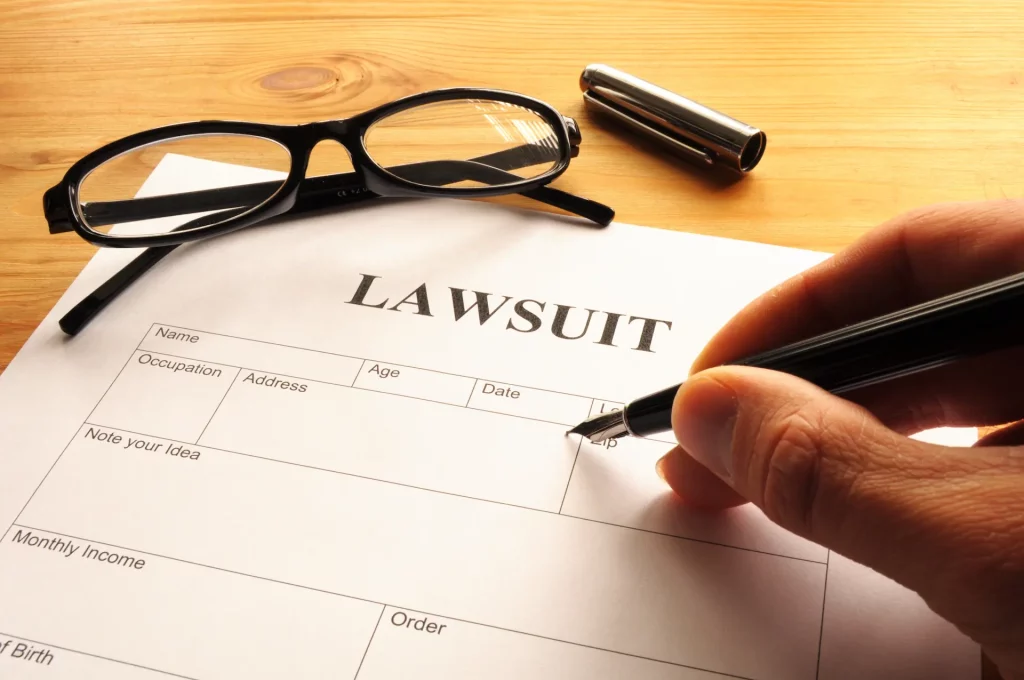How Long Does a Personal Injury Lawsuit Take?

Navigating the aftermath of an accident or injury can be overwhelming, particularly when it comes to seeking compensation for your damages. It’s normal to wonder, “How long does a personal injury lawsuit take?” Understanding the timeline of a personal injury lawsuit is crucial to managing expectations.
It’s also essential to understand what a personal injury lawsuit entails and to learn some practical tips for expediting the process, such as selecting an experienced personal injury attorney, maintaining communication, and considering alternative dispute resolution methods.
Understanding what a personal injury lawsuit entails and how long it takes can help you prepare for the journey ahead.
What is a Personal Injury Lawsuit?
A personal injury lawsuit is a claim for monetary damages filed in a court of law where a person seeks compensation for injuries and damages caused by someone else’s negligence or wrongful acts. The lawsuit will make one or more claims against the responsible party or parties, seeking damages in the form of financial compensation for medical expenses, lost wages, pain and suffering, physical impairment, mental anguish, disfigurement, and potentially more depending on the case and the harm that was caused.
How Long Does a Personal Injury Lawsuit Take?
The timeline of a personal injury lawsuit can be influenced by many factors. The range, however, can be anywhere from several months if the case can be settled to several years or more if the case must go to trial. The truth is, every case is different and the timeline varies from case to case.
Factors Influencing the Duration of a Personal Injury Lawsuit
Here are the key elements that can impact the timeline of a personal injury lawsuit:
The complexity of the case
A personal injury lawsuit’s timeline depends on its complexity, including liability facts, the severity and extent of the injuries, the number of parties involved, and whether liability is disputed.
Cases with severe injuries, ongoing medical care, or with multiple parties often take longer, as there is more information to process and more parties to engage with. On the other hand, in cases where negligence is clear and damages are clearly established, the lawsuit may conclude more quickly by way of settlement. For that to happen, the at-fault party and their insurance company must offer an amount of money that is acceptable to the injured person. Until that happens, the case cannot be settled. And when the at-fault party and their insurance company refuse to offer an acceptable amount, the case will need to be decided by a jury.
Injuries and treatment
The duration of your medical treatment and the extent of the injuries will impact the timeline of your case. Until a person has been released by their medical provider, or future medical care can be determined, it is rarely a good idea to resolve the case. This is to ensure a full and fair assessment of your damages can be made and incorporated into the monetary damages your attorney will ask you to be compensated for.
Pre-trial proceedings
Before a personal injury lawsuit goes to trial, there are several pre-trial proceedings to address. These include:
- Investigation and gathering evidence: Your attorney will need time to thoroughly investigate the accident, gather evidence, consult experts, and review medical records. This process may take longer if there are more parties involved or if evidence is challenging to find or collect.
- Negotiations and settlement attempts: In most cases, personal injury lawsuits are settled before reaching the trial phase. Negotiations and settlement attempts can speed up the process considerably. However, if both parties can’t agree on a settlement, the case may need to go to trial, which can take some time.
- Filing the lawsuit: If settlement negotiations fail, the next step is to file a lawsuit. The duration of this step depends on the court’s caseload and the complexity of preparing the necessary legal documents. Once the lawsuit is filed, the court will establish a timeline for the subsequent phases of the case.
Discovery phase
The discovery phase typically begins after the lawsuit has been filed and involves both parties exchanging information relevant to the case. This stage consists of:
- Exchange of information: Both parties will share relevant documents, medical records, witness statements, expert witness reports, and other evidence with each other. The duration of this phase depends on the complexity of the case and the number of parties involved.
- Depositions and interrogatories: Both parties will question the other party, relevant witnesses, and experts during depositions (oral interviews) and interrogatories (written questions). This part of the discovery phase can be time-consuming, depending on the number of people involved and their availability.
- Expert consultations: In some cases, expert opinions are necessary to establish liability or determine the extent of damages. Engaging experts, obtaining their reports, and potentially deposing them as witnesses can add to the duration of the discovery phase.
Trial preparation
Once the discovery phase is complete, both parties will start preparing for trial. This stage includes:
- Preparing witnesses: Your attorney will work with key witnesses to ensure they are prepared to testify in court. This process may involve going over their statements, gathering additional evidence, or arranging for expert witnesses. The preparation process can be time-consuming, depending on the number of witnesses involved.
- Developing legal strategies: Once you’ve identified the key witnesses, your attorney will begin developing a legal strategy that aligns with the facts of your case. This may involve preparing legal arguments and filing motions in court to help influence the outcome of the case. Your attorney will also work closely with you to ensure you understand the strengths and weaknesses of your case, and help you make informed decisions about how to proceed.
- Conducting pre-trial conferences: Courts often require pre-trial conferences to streamline the trial process. The scheduling of pre-trial conferences can depend on the court’s availability, which may contribute to the case’s timeline.
An experienced personal injury lawyer will help you understand how these factors will affect your case, allowing you to have accurate expectations of the timeline.

4 Tips for Expediting the Personal Injury Lawsuit Process
Navigating a personal injury case can be a complex and time-consuming process, but the following tips will help avoid unnecessary issues contributing to your case’s duration.
-
Choose an experienced attorney
Selecting a seasoned attorney who specializes in personal injury cases is crucial in bringing your case to a resolution as quickly as possible. An experienced personal injury attorney will not only be familiar with the procedures and requirements of the legal process but will also know the best strategies to navigate the system more efficiently.
-
Maintain open communication with your attorney
Keeping the lines of communication open with your attorney is vital during the personal injury lawsuit process. Regularly updating your attorney on any relevant developments in your medical condition and care, such as new medical providers, can significantly help move things along.
Additionally, promptly addressing any inquiries or requests from your attorney will ensure that they have the information they need without unnecessary delays.
-
Cooperate with investigations and discovery requests
Both parties in a personal injury case must participate in the investigation and discovery process, exchanging relevant information and evidence. It’s essential to cooperate with these requests, providing any necessary documents in a timely manner, as they can directly impact the time it takes for your case to be resolved. By being proactive and organized, you can help prevent any unnecessary delays from occurring.
-
Consider alternative dispute resolution methods
Alternative dispute resolution (ADR) is a term that encompasses methods for resolving disputes outside of the courtroom, such as mediation. Often, choosing mediation can lead to a faster resolution than going through the traditional court process. Your attorney will be able to advise you on whether this is a suitable option for your case and how it may help expedite the resolution of your personal injury lawsuit.
Remember, the goal is to resolve your personal injury lawsuit efficiently while ensuring you receive fair compensation for your injuries. While expediting the process is important, it should never come at the expense of receiving proper compensation.
Is Your Personal Injury Lawsuit Taking Too Long?
Understanding the duration of a personal injury lawsuit is essential for managing expectations and navigating the legal process effectively. While providing an exact timeline for every case is challenging, considering the various factors influencing the duration can help you prepare for the journey ahead.
With the right support and guidance from a personal injury attorney in Houston and Pasadena, you can confidently navigate the legal process, advocating for your rights and moving towards a resolution that provides the compensation necessary to recover and move forward.
FAQs: Frequently Asked Questions
Why is my lawyer taking so long to settle my case?
There can be several reasons why your lawyer might take longer to settle your case. This could be due to the following:
The complexity of the case: If your case involves complex legal issues, multiple parties, or disputed liability, it may require more time for investigations, negotiations, and building a strong case.
Gathering evidence: Your lawyer must gather all relevant evidence to support your claim. This can involve obtaining medical records, accident reports, witness statements, and expert opinions.
Negotiations: Settlement negotiations can be a lengthy process. Your lawyer needs to communicate with the opposing party and their insurance company, engaging in back-and-forth discussions to reach a fair settlement agreement.
Court backlog: Courts often have a backlog of cases, leading to delays in scheduling settlement conferences or obtaining court dates for hearings. Your lawyer will need to navigate these scheduling challenges, resulting in a longer process.
How long does a lawsuit take to go to court?
There is no one-size-fits-all answer to how long a personal injury lawsuit takes to reach a resolution. Multiple factors influence the duration of the process, from the complexity of the case to the cooperation of insurance companies. Ultimately, a lawsuit can take many months or years before it goes to court.

Michael S Callahan is an attorney and founder of The Callahan Law Firm. He focuses his practice on representing individuals and families in personal injury cases involving motor vehicle and truck accidents, workplace accidents and defective products. With over 25 years of experience, he is dedicated to fighting on behalf of people whose lives have been forever altered by the negligence and carelessness of corporations and individuals. Originally trained as a mechanical engineer, Michael has been practicing law and fighting for justice for those who need it most since 1994. He is board-certified in Personal Injury Trial Law by the Texas Board of Legal Specialization and a member of various esteemed legal associations. Outside of work, Michael enjoys spending quality time with his family, outdoor activities, and continually striving to improve as a trial lawyer and human being.











